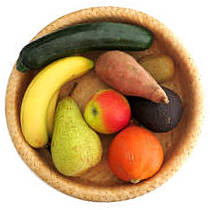Nutrition Guide for Asthma Sufferers:
How to Fight and Relieve Asthma Symptoms Naturally Through Nutrition
Your one-stop source for information on the optimal diet, the top 19 foods, and the best recipes for preventing and relieving asthma symptoms.

Asthma is a respiratory disorder affecting the airways of the lungs. The airways of asthma sufferers occasionally constrict, become inflamed, and start making more mucus, often in response to an allergen (such as cold air, exercise, infection, tobacco smoke, or emotional stress). This may result in symptoms like wheezing, coughing (especially at night), trouble breathing, or a feeling of constriction within the chest. Some asthmatics may have no symptoms for long periods of time but are then suddenly attacked by asthma symptoms, while others experience symptoms more frequently. Asthma has gained much public attention in recent years, as the condition is rapidly becoming more prevalent, afflicting almost 20 million Americans today. The most effective way of controlling asthma is identifying triggers of the attacks and limiting exposure to them. However, if trigger avoidance is insufficient, a number of drugs are available. Moreover, nutritional choices may also help reduce attacks and the severity of symptoms.
What you will find in this GuideThis Nutrition Guide for Asthma Sufferers aims to provide comprehensive information on how to fight asthma naturally at home with food and proper nutrition. The page you are currently viewing is the home page of the Guide — all the latest news and tips are published here, so be sure to bookmark this page! Other sections provide information on dietary habits and foods that can help fight and alleviate asthma symptoms as well as delicious anti-asthma recipes. You can navigate this Guide by using the menu on the right.
Important Notice: The information on this website, including the information above, has not been verified for correctness or completeness, and some of the information may not be correct. Information included on this website is not a substitute for professional nutrition advice or for professional medical or health advice, examination, diagnosis or treatment. Always seek the advice of your physician or other qualified health professional before starting any new treatment, making any changes to existing treatment or altering your current exercise or diet regimen.
THIS WEEK'S SMOOTHIE CHALLENGE
Blueberries contain pterostilbene, a compound that – according to preliminary studies – might help protect against asthma by reversing airway inflammation caused by certain environmental pollutants. Avocado, in turn, is packed with vitamin E and other antioxidants that may help control asthma symptoms by reducing inflammation. The potential anti-asthmatic properties of this refreshing smoothie are further boosted by the addition of chia seeds which are loaded with anti-inflammatory omega-3 fatty acids. Click on the link below to view the recipe, as well as the beloved Tweak It! box which allows you to create a new variation of the basic recipe for every day of the week.
 View This Recipe
View This Recipe View Last Week's Recipe
View Last Week's Recipe
HEALTHIFY YOUR KITCHEN
In Focus This Month: The Spiralizer
Vegetable 'pasta' makers, or spiralizers, are revolutionizing the way we eat our veggies. These ingenious kitchen gadgets turn firm vegetables – such as zucchini, carrots, potatoes – into attractive, spaghetti-shaped vegetable ribbons that can be eaten the same way as real pasta. Made of unprocessed whole vegetables, these imitation noodles are typically low in simple carbs, free of gluten, and rich in vitamins, which makes them a wonderful addition to anyone's diet, including people with asthma. To learn more, check out this month's special feature:
Other Invaluable Kitchen Tools:








